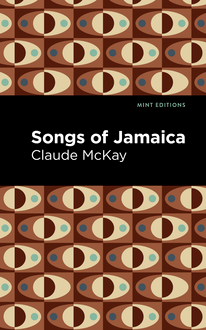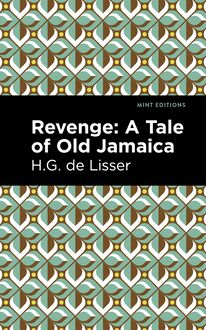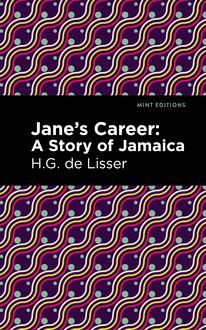-
 Univers
Univers
-
 Ebooks
Ebooks
-
 Livres audio
Livres audio
-
 Presse
Presse
-
 Podcasts
Podcasts
-
 BD
BD
-
 Documents
Documents
-
- Cours
- Révisions
- Ressources pédagogiques
- Sciences de l’éducation
- Manuels scolaires
- Langues
- Travaux de classe
- Annales de BEP
- Etudes supérieures
- Maternelle et primaire
- Fiches de lecture
- Orientation scolaire
- Méthodologie
- Corrigés de devoir
- Annales d’examens et concours
- Annales du bac
- Annales du brevet
- Rapports de stage
La lecture à portée de main
Vous pourrez modifier la taille du texte de cet ouvrage
Découvre YouScribe en t'inscrivant gratuitement
Je m'inscrisDécouvre YouScribe en t'inscrivant gratuitement
Je m'inscrisEn savoir plus
Vous pourrez modifier la taille du texte de cet ouvrage
En savoir plus

Description
Maroon Medicine (1905) is a short story collection by E. A. Dodd. Published by the All Jamaica Library under the pseudonym E. Snod, Maroon Medicine was the first collection of short stories written by a Caribbean author. Inspired by Anansi, a spider-trickster spirit from West African folklore, Maroon Medicine is a highly original work of fiction that paved the way for generations of fiction writers across the Caribbean. “‘An a what me got fe Chris’mas bar dis little maugre pig? Me cawfee no sell well, and me premento don bear, a what me got? Me we have to do sompin?’” Mr. Watson, a rather weak man with little talent for farming, is desperate to earn money before Christmas. When his neighbor stops by to chat, he hears how the man’s wife has been struggling to overcome a debilitating illness through a series of herbal medicines. Suggesting he knows more than he does about herbs and other native ingredients, Watson realizes there is money to be made in healing the sick—or at least in trying. Soon, he gets his business off the ground. The four stories of this collection—“Maroon Medicine,” “Paccy rum,” “Red cock,” and “Courting of the dudes”—capture the wit and determination of Mr. Watson, a character who does his best to get by with the little he has. With a beautifully designed cover and professionally typeset manuscript, this edition of E. A. Dodd’s Maroon Medicine is a classic of Jamaican literature reimagined for modern readers.
Sujets
Informations
| Publié par | Mint Editions |
| Date de parution | 28 septembre 2021 |
| Nombre de lectures | 1 |
| EAN13 | 9781513210766 |
| Langue | English |
| Poids de l'ouvrage | 2 Mo |
Informations légales : prix de location à la page 0,0300€. Cette information est donnée uniquement à titre indicatif conformément à la législation en vigueur.
Extrait
Maroon Medicine
E.A. Dodd
Maroon Medicine was first published in 1905.
This edition published by Mint Editions 2021.
ISBN 9781513211961 | E-ISBN 9781513210766
Published by Mint Editions®
minteditionbooks.com
Publishing Director: Jennifer Newens
Design & Production: Rachel Lopez Metzger
Project Manager: Micaela Clark
Typesetting: Westchester Publishing Services
C ONTENTS P REFACE M AROON M EDICINE P ACCY R UM T HE R ED C OCK T HE C OURTING OF THE D UDES
P REFACE
In the four short stories that are now set forth to the Public,—I have in no way touched upon the Social Problems I might say Problem,—which, as a rule, engross the attention of writers who deal with life in Tropical Countries. On the contrary, I have avoided all such deep questions, and have attempted merely to portray the lighter and more pleasant side of the labouring class in the hills. The stories, indeed, are scarcely more than sketches, but sketches, from life, and as such may have some value.
I have tried to instil into this little book, the spirit, so gay and careless of the people I have encountered, and their simple cuteness. Mr. Watson, however, is hardly an ordinary type, and has been made up from two or three characters. Some people may object to the two love letters in the story, “The Courting of the Dudes,” as being too well expressed and civilized, but it may be remarked that they were composed very much after the manner and matter of two or three letters that had been actually written and which I had the good fortune to read.
E.A. D ODD ,
Jamaica
M AROON M EDICINE
It was just one of the cottages that you see scattered all over Jamaica; possessing four walls made of plaster and lathes, and a thatched roof—the whole enclosing two rooms, dignified by the names, of bed-room and hall. From one corner stretched a small barbecue, which again at one corner fed a small, “Kick-um-buck” tank, covered over with rough logs to prevent people falling in. All around, for the space of about half an acre, grew in picturesque medley, coffee bushes, yams, breadfruit trees, orange trees, the products of the lower mountains in the Parish of Manchester. A couple of fowls scratched around the house, and a hungry-looking pig messed about his little railed in pen.
It had rained in the night, but the morning had broken exceeding fresh and fair, warm yet cool, with a bright beauty that I cannot believe could have been surpassed anywhere. It may be that the pig felt something of this, or it may be that he knew that his morning meal was nearly ready, but undoubtedly he felt happy and showed it in little unmusical squeals. His master sat at the edge of the barbecue, chopping up into a box with his cutlass, steadily and with attention, a few small canes. Having finished chopping all except one choice bit which he reserved for his own consumption, he rose and went to the pen, where he put the box before the pig. He then proceeded to chew his own piece of cane, with a certain amount of intelligent repose on his face.
This face of his was long and of a neutral brown, with the bony chin going in sharply up to the neck. The man had a wide and mobile mouth, with a quaint twitch at one side, two small twinkling eyes and a bald and sloping forehead under his hat of plaited thatch.
It was a perfect morning in the end of November, yet to judge from the slight frown which crept up and marred the repose of Mr. Watson’s face, one could not think the latter was in sympathy with nature’s peace. The reason was simple, Mr. Watson had very little ready money; and Christmas was coming, and he felt aggrieved with himself and his wits, which were not in the habit of failing him. His thoughts ran in this groove:
“An a what me got fe Chris’mas bar dis little maugre pig? Me cawfee no sell well, and me premento don bear, a what me got? Me we have to do sompin?”
His musing was suddenly interrupted by the approach of a neighbour, who was walking through to his ground, and who stopped to salute him.
“Hi, mornin’ Miser Watson!”
“Mornin’, Coz! How you do?”
“So, so, sah, a not too well an’ a not too bad, you a feed you pig, sah”
Mr. Watson turned carelessly and twitched the few scraggy hairs that formed his whiskers, with a gesture peculiar to him.
“Yes, sah, me a feed him, but a wha de use? I buy him back dis tree weeks from Miser White at James Hall, and I gie’m yam pealin! cocoa head, banana an’ all sort o’ ting, an look pon him now, h’no ah piece fatter than when I buy him. Well (with emphasis) as you might seh, a doan pay much fe him, but it tan like a not goin get no more fe him.”
“Hi, but a wha do de pig den?” said the neighbour sympathetically. “Him really ought fe fat. Aldo some of dem, a so dey tan. I remember dis man Joe Crawford got a pig; well when he buy him, h’ not too fat so h’n get plenty o feedin’, cane, cocoa head an’ I don know what; an’ him feed that pig fe true, but you believe me sah, dat pig was no fatter at de end of tree monts dan when he got him fus’ time. Mus a same way wid dis.”
Mr. Watson looked with a philosophical calm at the pig.
“Well, it may be. Ah same way wid some man; you wi see some o’ dem eat, eat, an eat and yet dem never get fat, dey tin all de time.”
“You speak true, sah, a same way wi some men.”
After a pause the neighbour hitched his bankra better on his shoulder and said:
“Yes, sah, ah jus’ a walk trew to me groun’ go look somepin for me wife.”
“You welcome, you welcome,” said Mr. Watson hospitably, “a no hear you wife sick? a fe true?”
“Yes sah. It true! night before las’ she tek in wid a single pain in de stomach, De pain hol’ her dat way. Well she go to bed, an’ ah tek dis bush dem call “Piobba” and a bwoil it down and mek some tea, gie ’er but it doan any good, den ah mek some oder tea out o’dis other bush; “Vervain,” an’ gie ’er dat, but dat also doan do any good; and all dis time de pain dat bad. Well yesterday about sun hot, Mrs. Weekly advise me try some soda and nut oil mix wid a little water and I do so, and since then she feel a little better and could walk bout de yard in the evenin’. Yes sah she really sick but she not too bad dis morning.”
During this speech Mr. Watson showed his sympathy in a few well chosen sounds and affirmatives which cannot be reproduced by any combination of letters.
“Ah glad fe hear she better. Some of dese teas is really wonaful. To be sure some doctors good. I woan seh dey not, but mos’ time you go to dem, you jus’ wase you money. Dis bush or dat is all I want.”
“You right, Miser Watson, you quite right,” agreed the other heartily, “Some doctors no wut a grass louse, aldo dis Doctor Pratt him really good.” Then moving on, “Well ah gone, Miser Watson.”
“Yes, sah. Mr. Watson sent him on his journey with a wave of his hand and then resumed the reflective chewing of his cane. I may remark here that the man’s ground was five miles away, but there is nothing strange in this; for the Jamaica Peasant will travel up to ten or twelve miles to get some fresh piece of land to till and work as a ground. Every two or three years he throws up one piece and takes another fresh bit.
After his friend’s departure Mr. Watson’s face took on an even more reflective look; and for half an hour he lolled in deepest thought; then straightening with a brightened face, he walked into his house, and emerged with his jacket on, having been without it before.
His face now was the calm inscrutable and cunning face of Mr. George Watson of Every Garden. This was the name of his place, but how it had arisen, and what was its origin, Mr. Watson himself did not know.
He left the house and yard now in charge of a little ragged girl, his daughter, and took one of those paths, which fed the main road like tributaries of a river. Coming out on this, he walked for about three miles, when he came into a village, consisting of two or three rival shops which sold various, assorted articles, from very weak rum to a drawing book, and a couple of professional houses of shoemakers and blacksmith. At one of the former he bought a sixpence worth of soda, and between the three, two dozen pint bottles, saying in sort of excuse that Mrs. Smith (who made bread) had asked him to buy the former for her, and as regards the latter, he was speculating in bottles, and was going to sell to a man from Kingston. He also gave out that he was going up to the Mile Gully Mountains to invest in ginger.
Having bought what he wanted, and having refreshed his mind with a little light conversation, he left and went home where he was busy all day mixing in the privacy of his half-tumbled down kitchen, some vile-looking stuff.
It was perhaps between four and five next morning when Mr. Watson started for the Mile Gully Mountains “to invest in Ginger,” driving his donkey, yclept Alice, before him. The hampers contained the two dozen bottles he had bought the day before, a dozen on either side, empty no longer—also some little provision for his journey—a gill bammy, a little pork already boiled, some yams and some oranges. His house he had locked up, but the pig and the cultivation around he had left on the charge of his neighbour and daughter. This latter by the way being driven from under the paternal roof, had taken up her abode for the time being with her aunt (?) She was not Mr. Watson’s only child, having three brothers and a sister alive. These, however, having come to the conclusion that their father was not perfect, in his ideas regarding obedience in his children, had severally run away to other yards, a common enough practice in Jamaica. Needless to say, Mr. Watson did not go after them. His was a philosophical soul and he in no way regretted not having to feed three hungry children. He would not have received them back; and his children knew it.
By the time the sun had risen and another perfect day had begun, Mr. Watson had passed Mandeville and was nearing Williamsfield. On reaching the latter place, he sto
-
 Univers
Univers
-
 Ebooks
Ebooks
-
 Livres audio
Livres audio
-
 Presse
Presse
-
 Podcasts
Podcasts
-
 BD
BD
-
 Documents
Documents
-
Jeunesse
-
Littérature
-
Ressources professionnelles
-
Santé et bien-être
-
Savoirs
-
Education
-
Loisirs et hobbies
-
Art, musique et cinéma
-
Actualité et débat de société
-
Jeunesse
-
Littérature
-
Ressources professionnelles
-
Santé et bien-être
-
Savoirs
-
Education
-
Loisirs et hobbies
-
Art, musique et cinéma
-
Actualité et débat de société
-
Actualités
-
Lifestyle
-
Presse jeunesse
-
Presse professionnelle
-
Pratique
-
Presse sportive
-
Presse internationale
-
Culture & Médias
-
Action et Aventures
-
Science-fiction et Fantasy
-
Société
-
Jeunesse
-
Littérature
-
Ressources professionnelles
-
Santé et bien-être
-
Savoirs
-
Education
-
Loisirs et hobbies
-
Art, musique et cinéma
-
Actualité et débat de société
- Cours
- Révisions
- Ressources pédagogiques
- Sciences de l’éducation
- Manuels scolaires
- Langues
- Travaux de classe
- Annales de BEP
- Etudes supérieures
- Maternelle et primaire
- Fiches de lecture
- Orientation scolaire
- Méthodologie
- Corrigés de devoir
- Annales d’examens et concours
- Annales du bac
- Annales du brevet
- Rapports de stage















